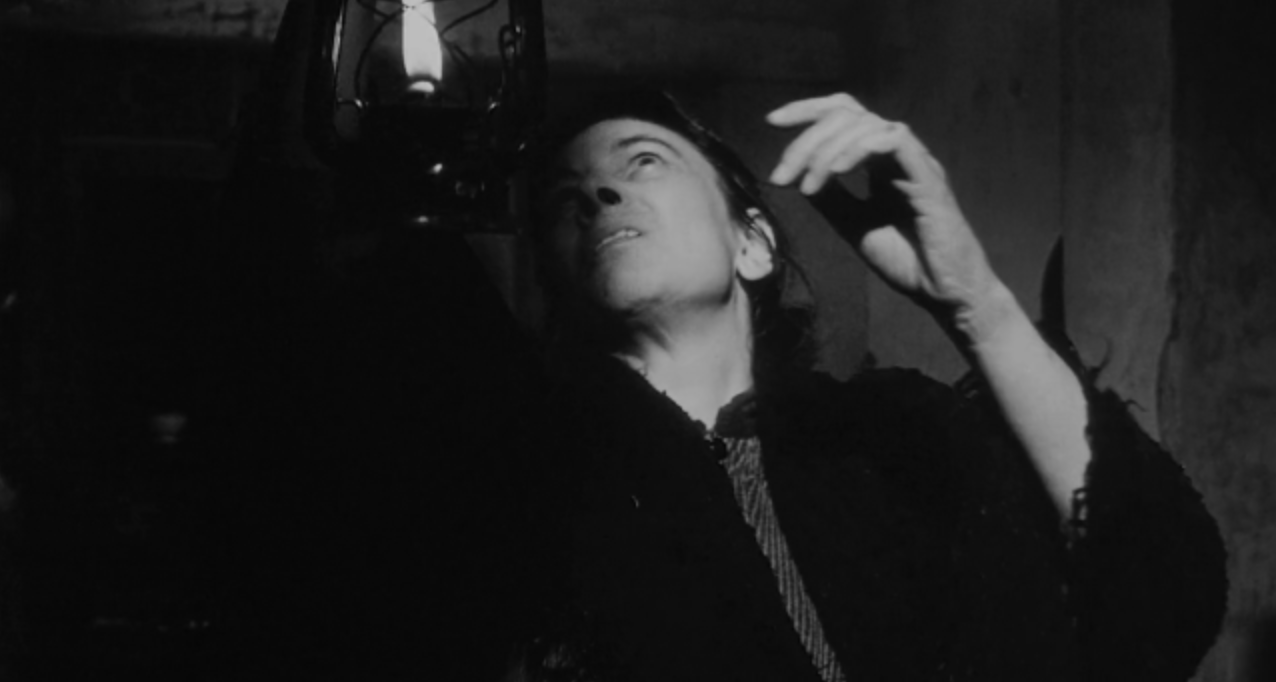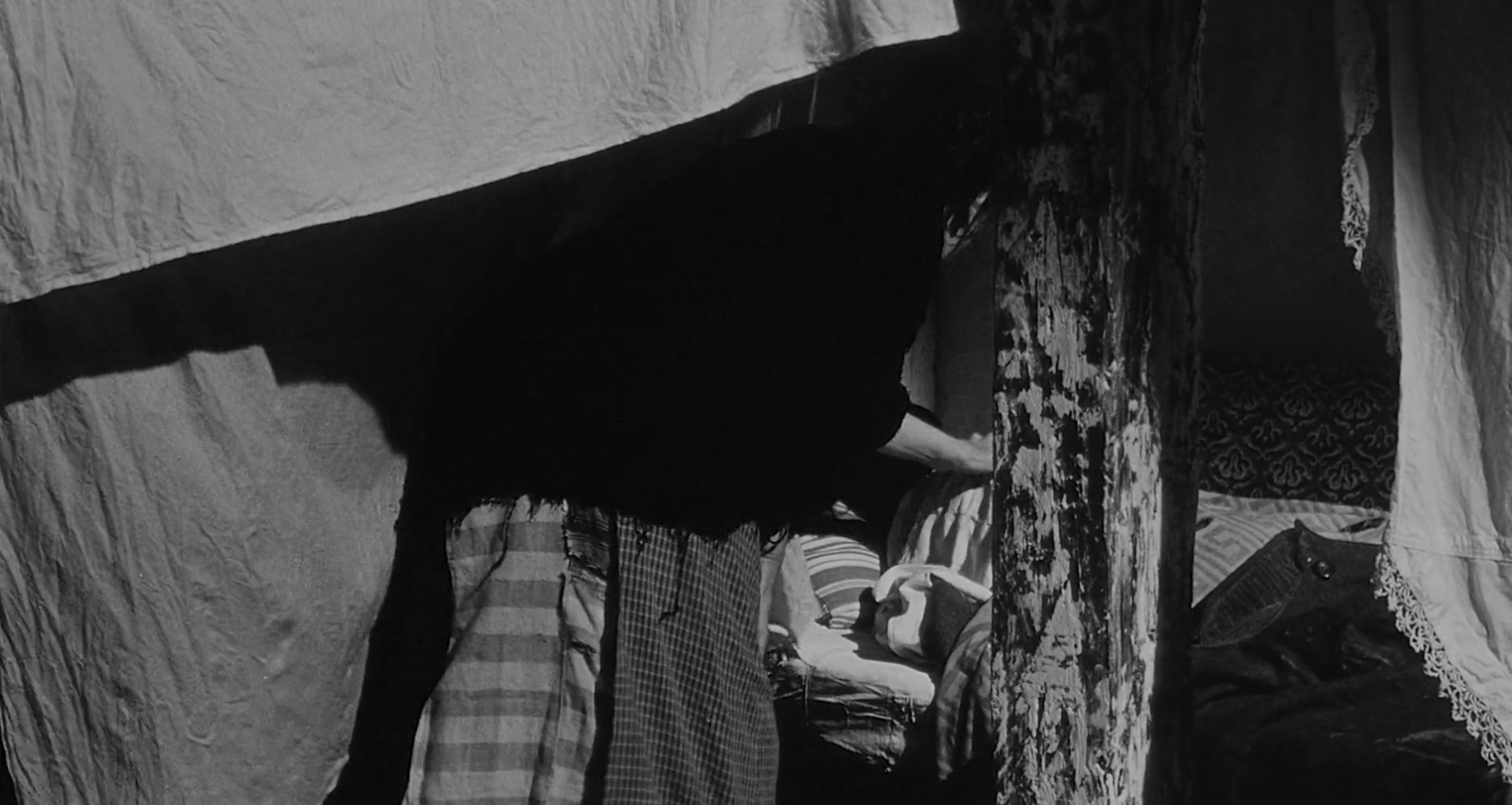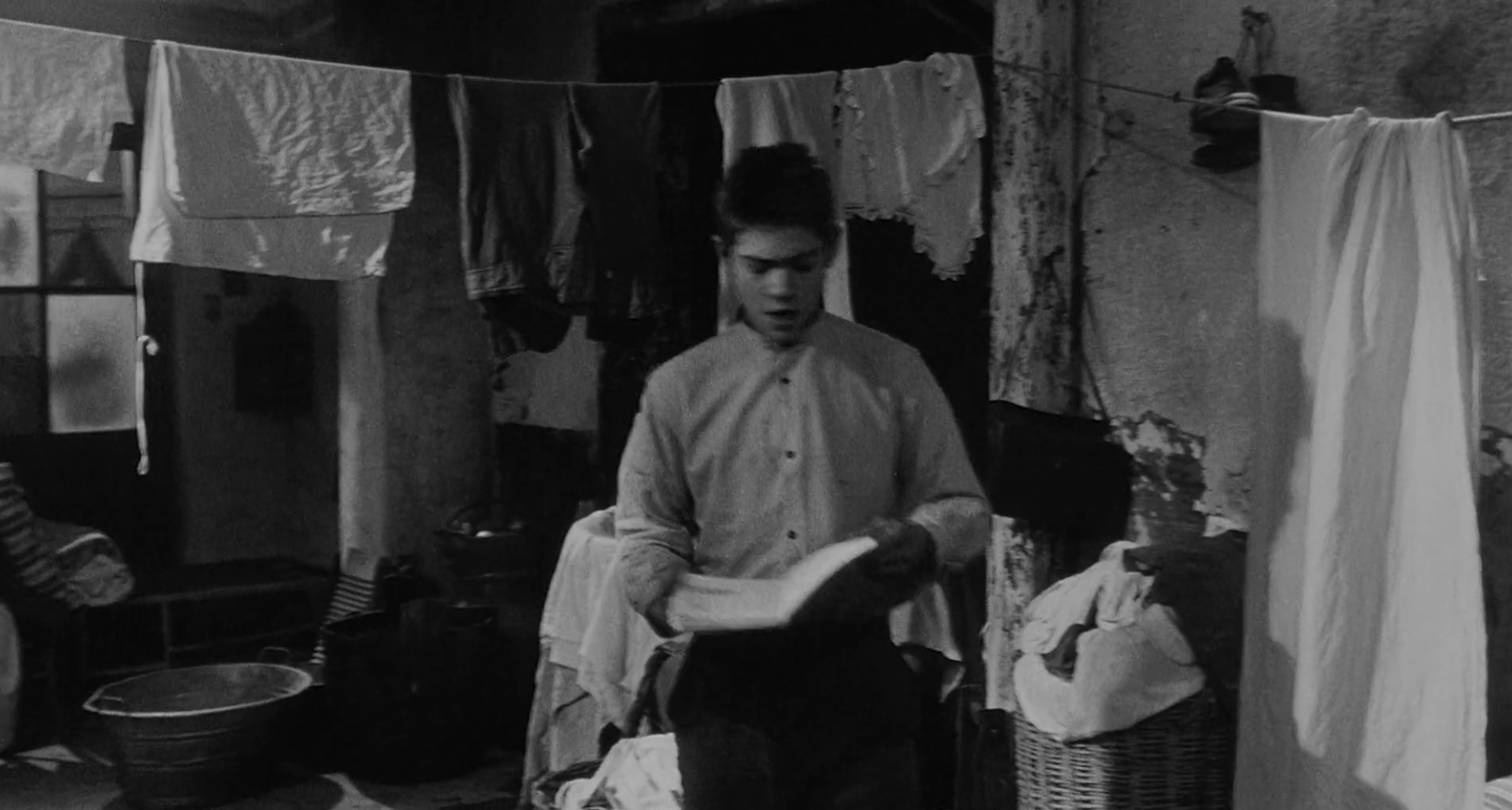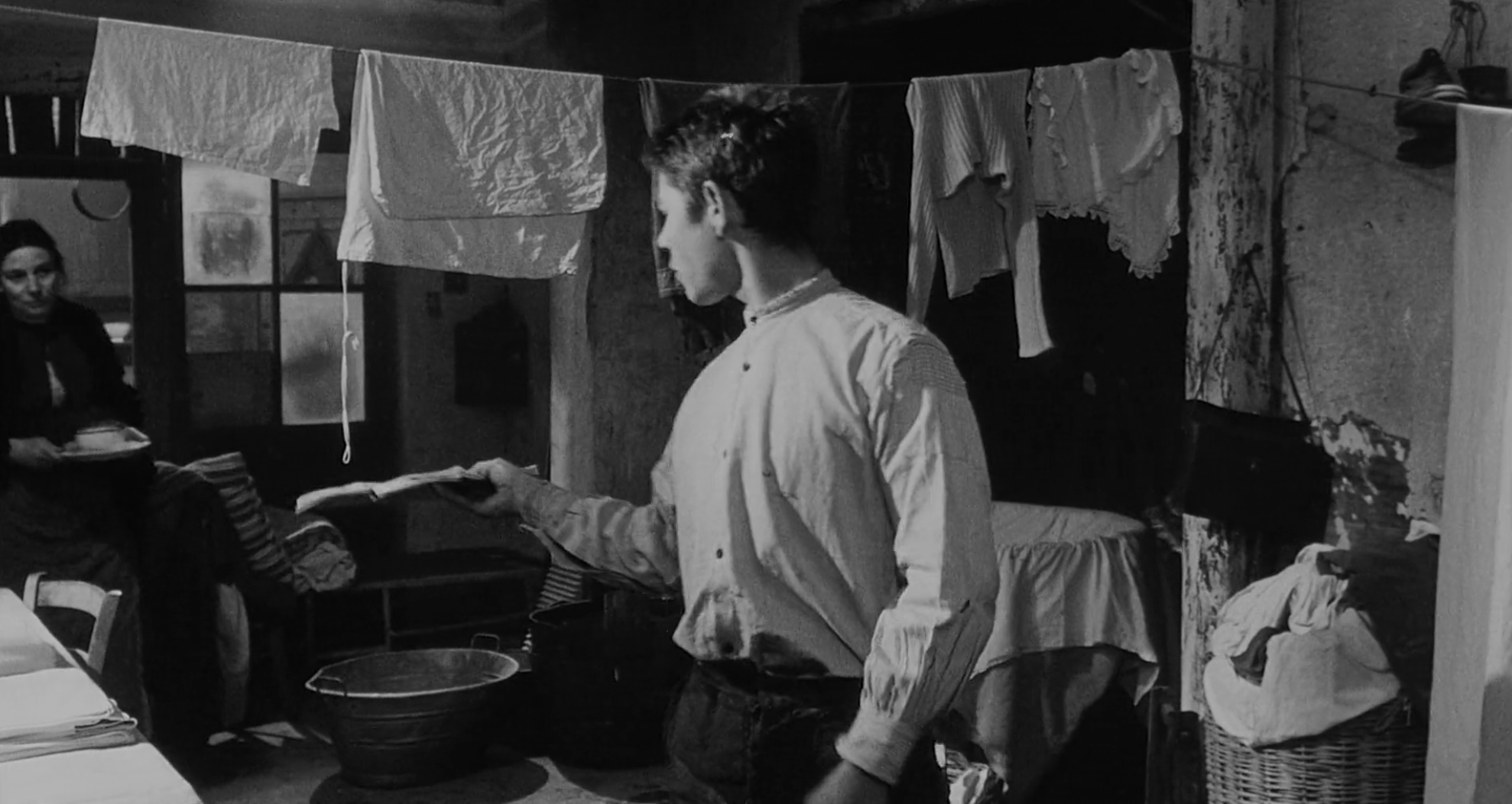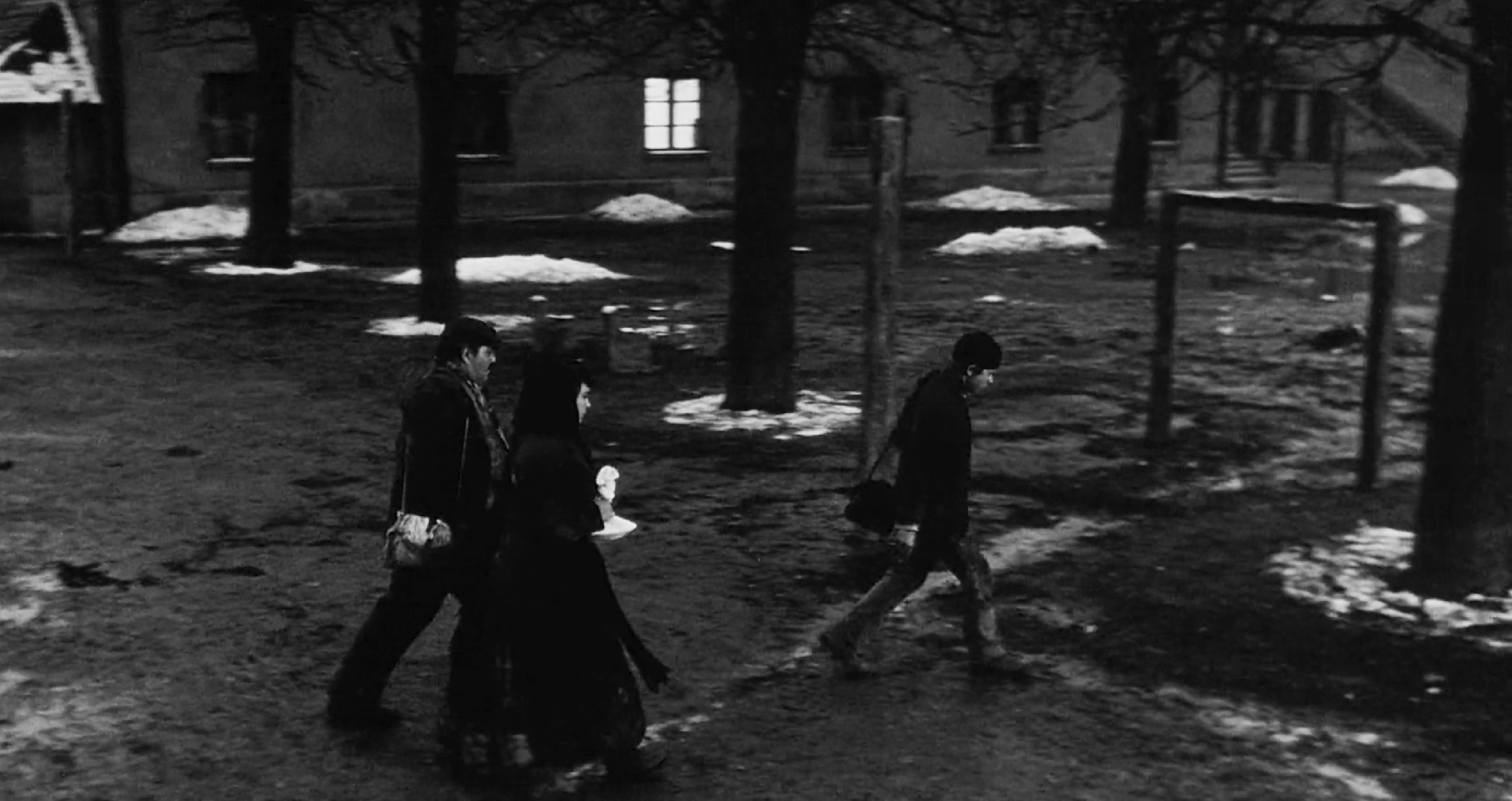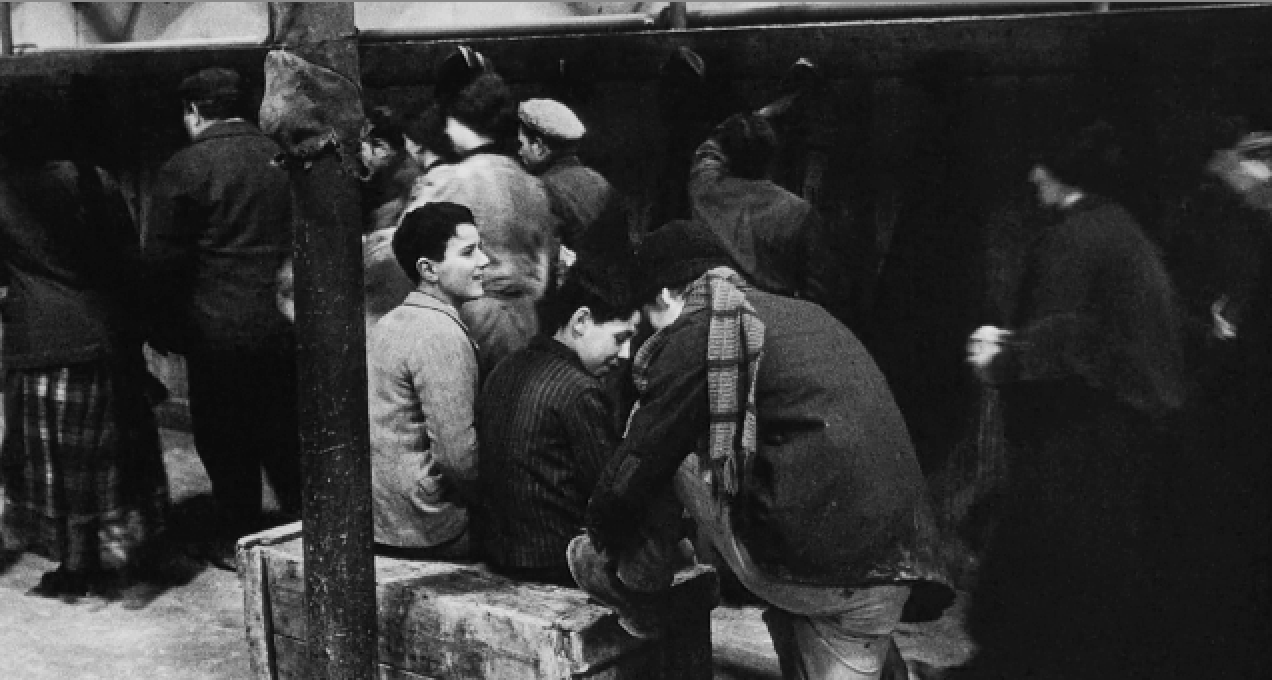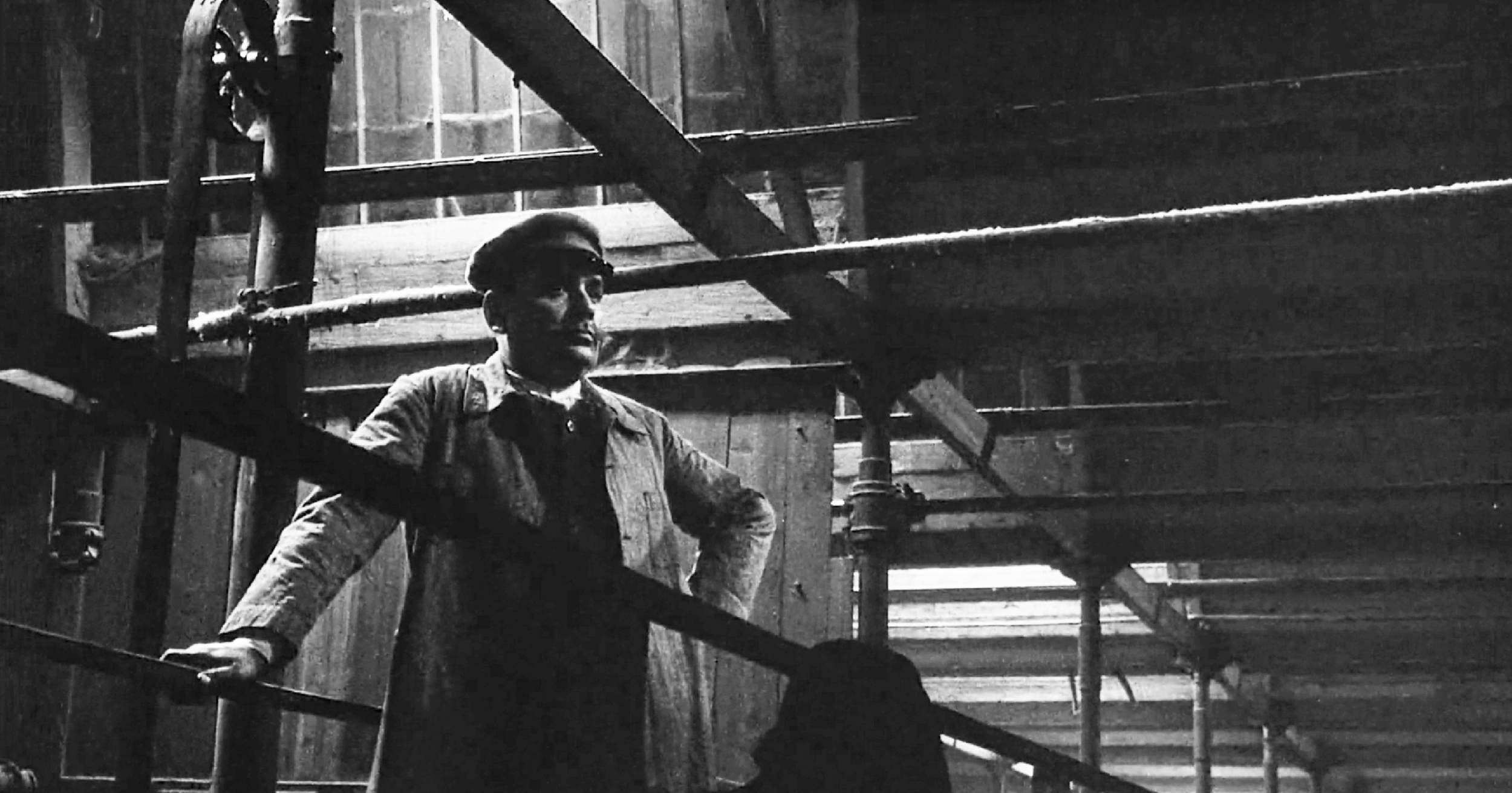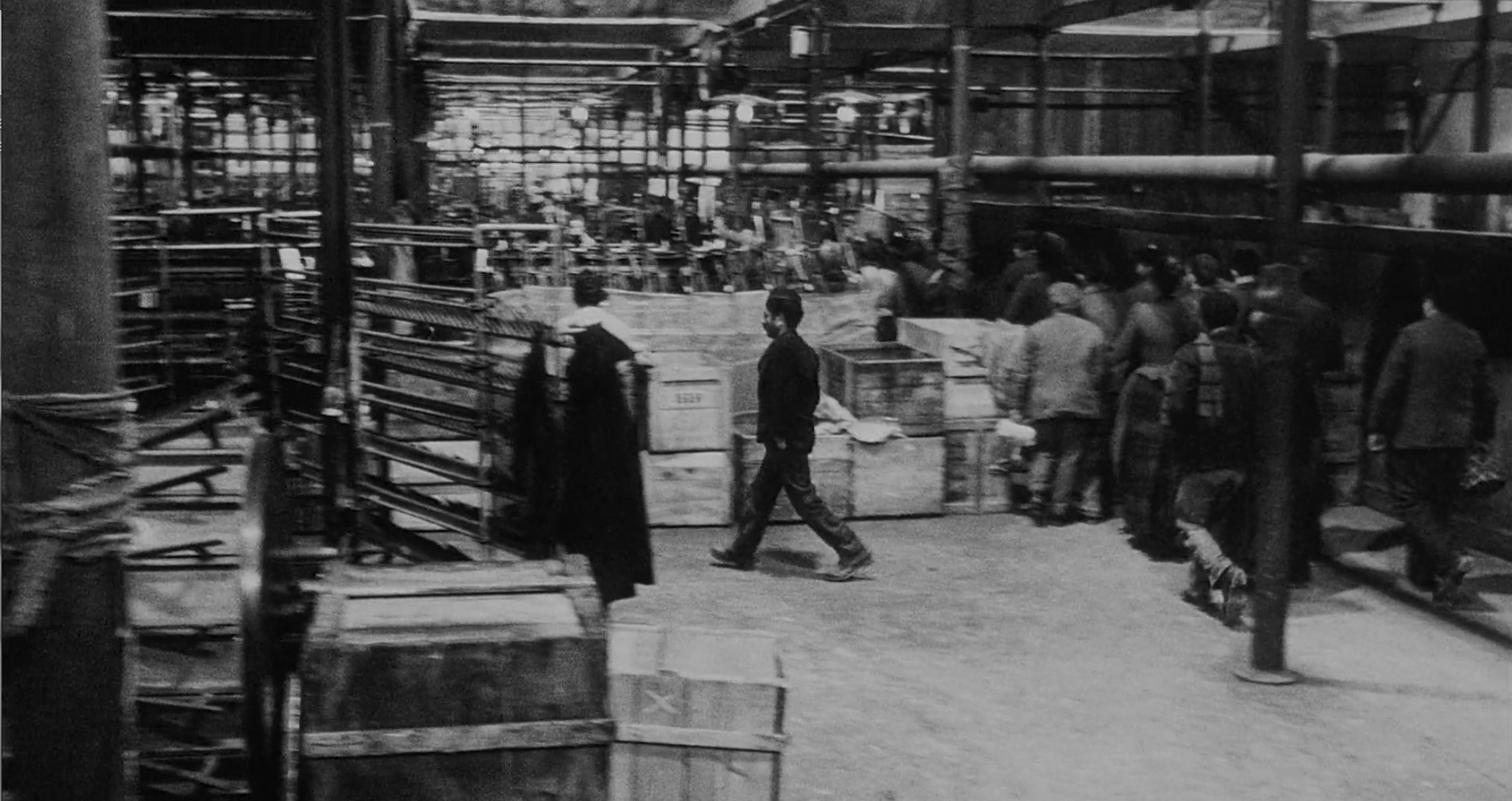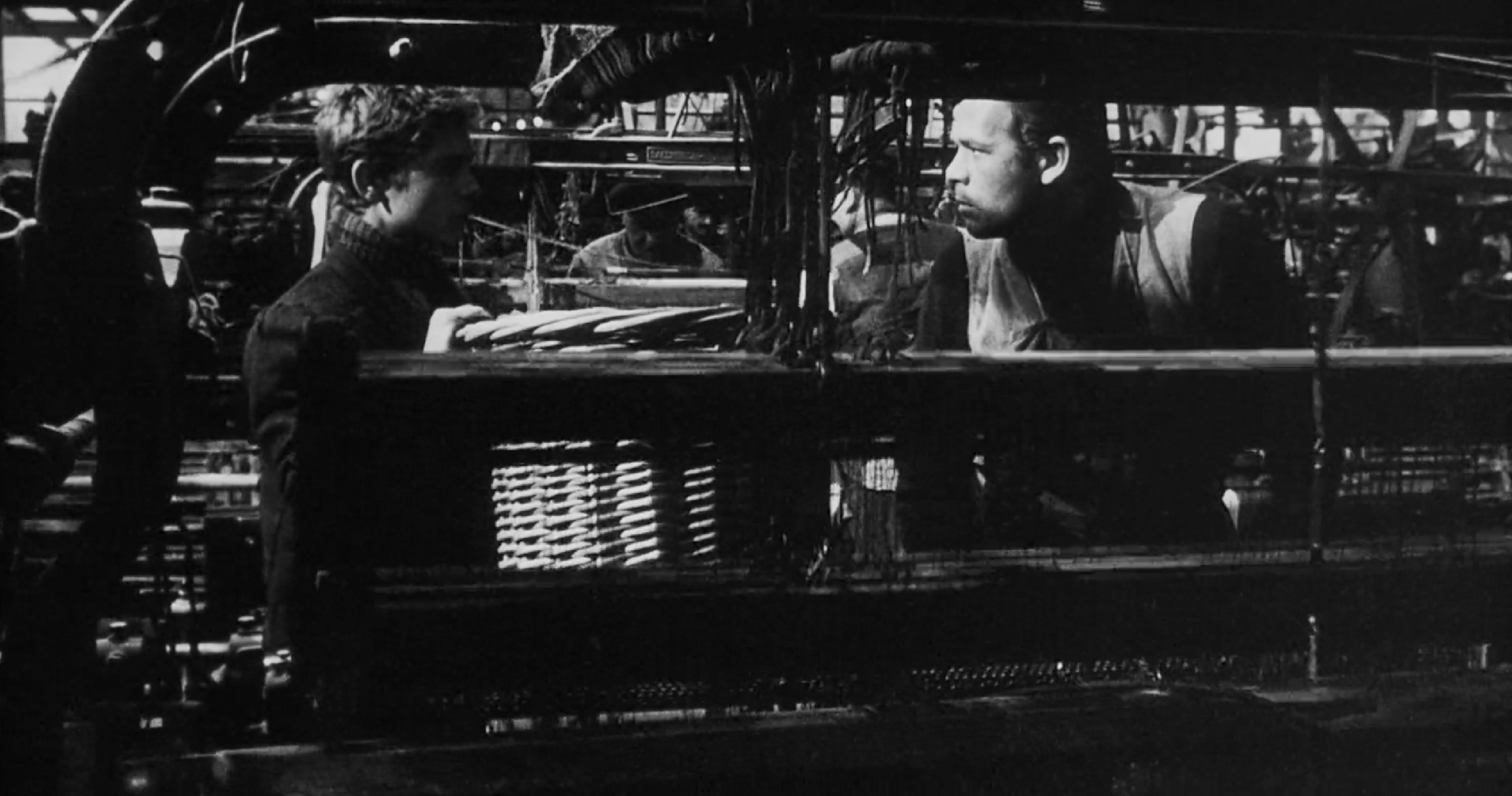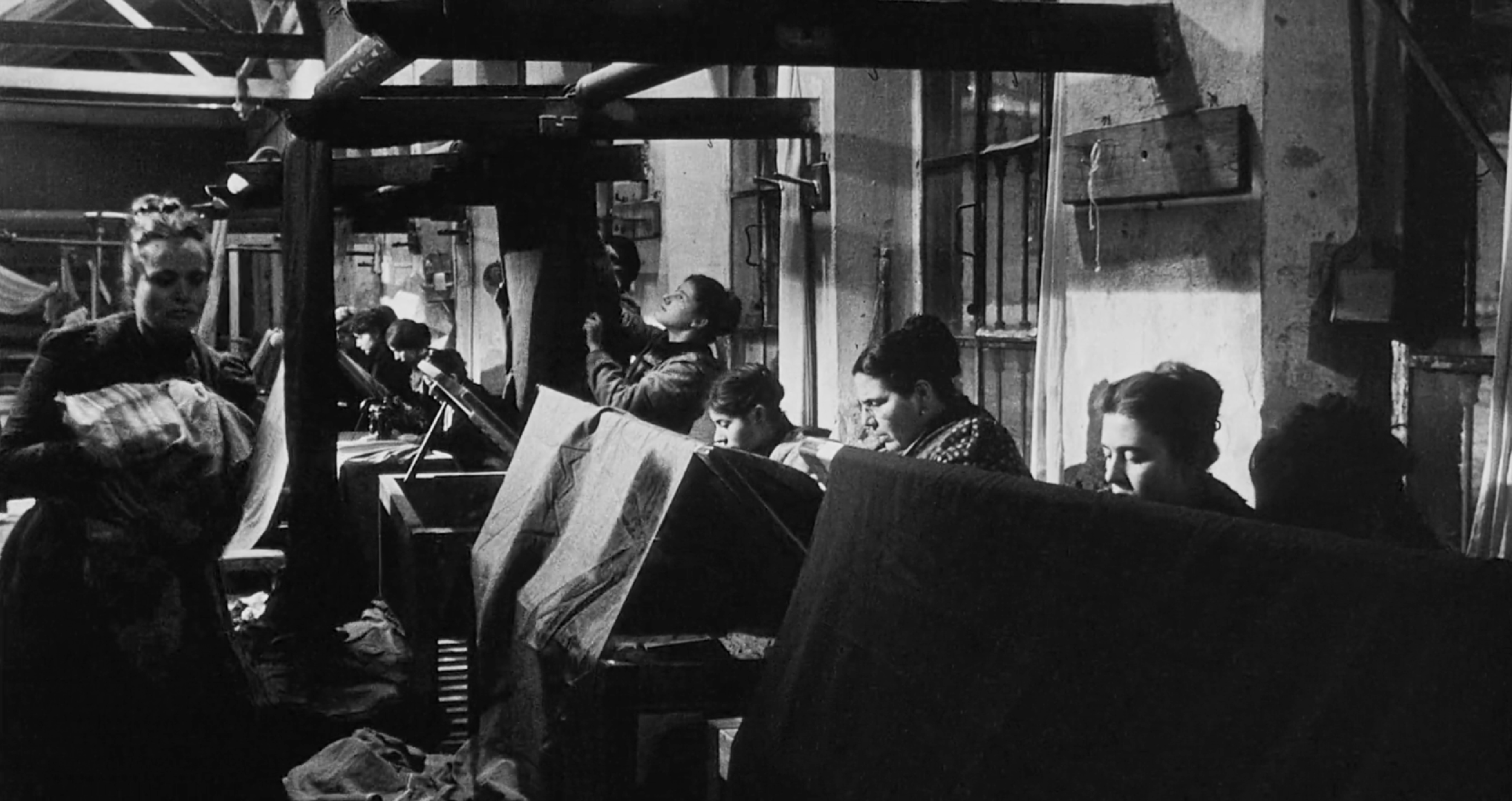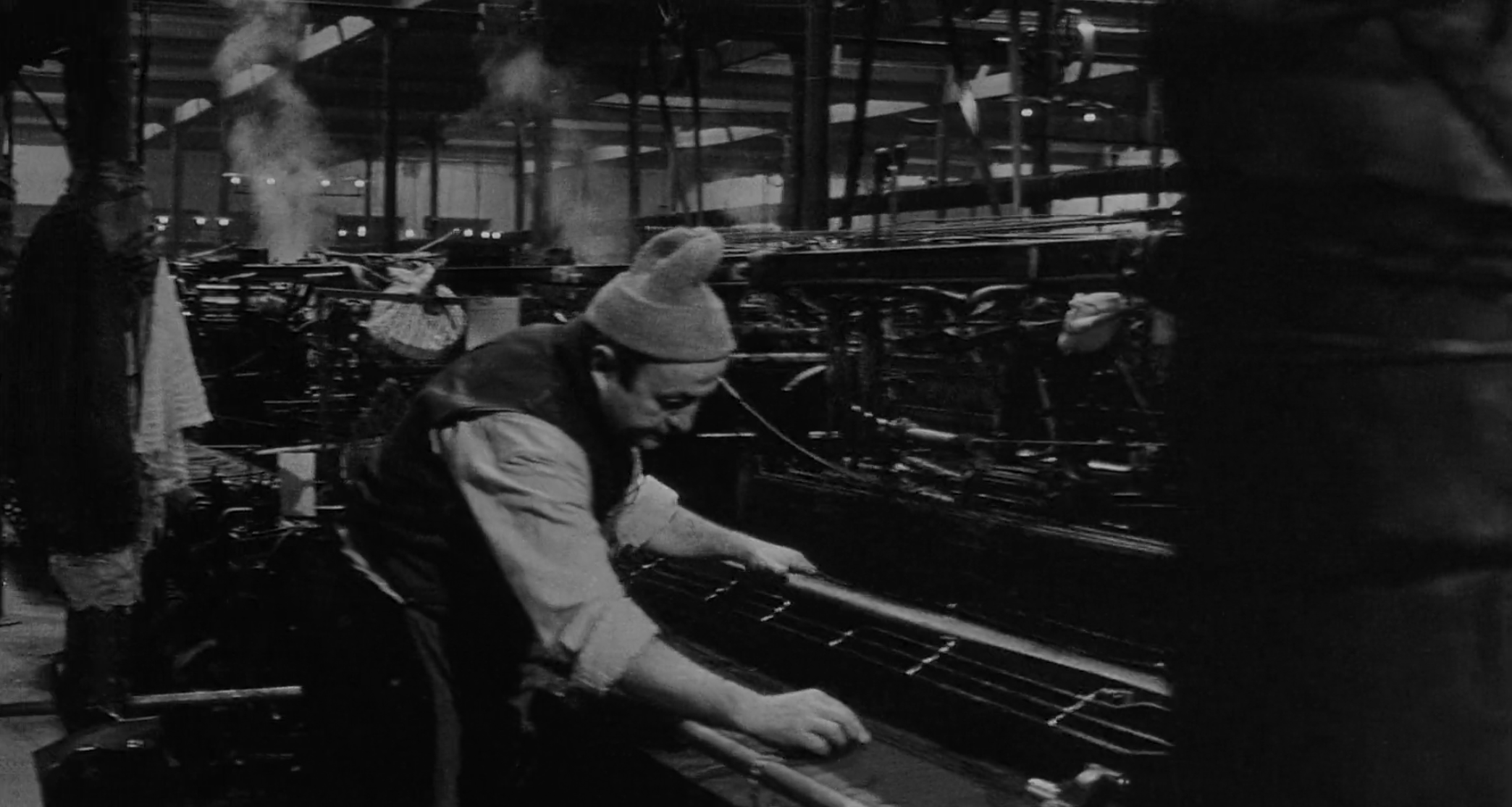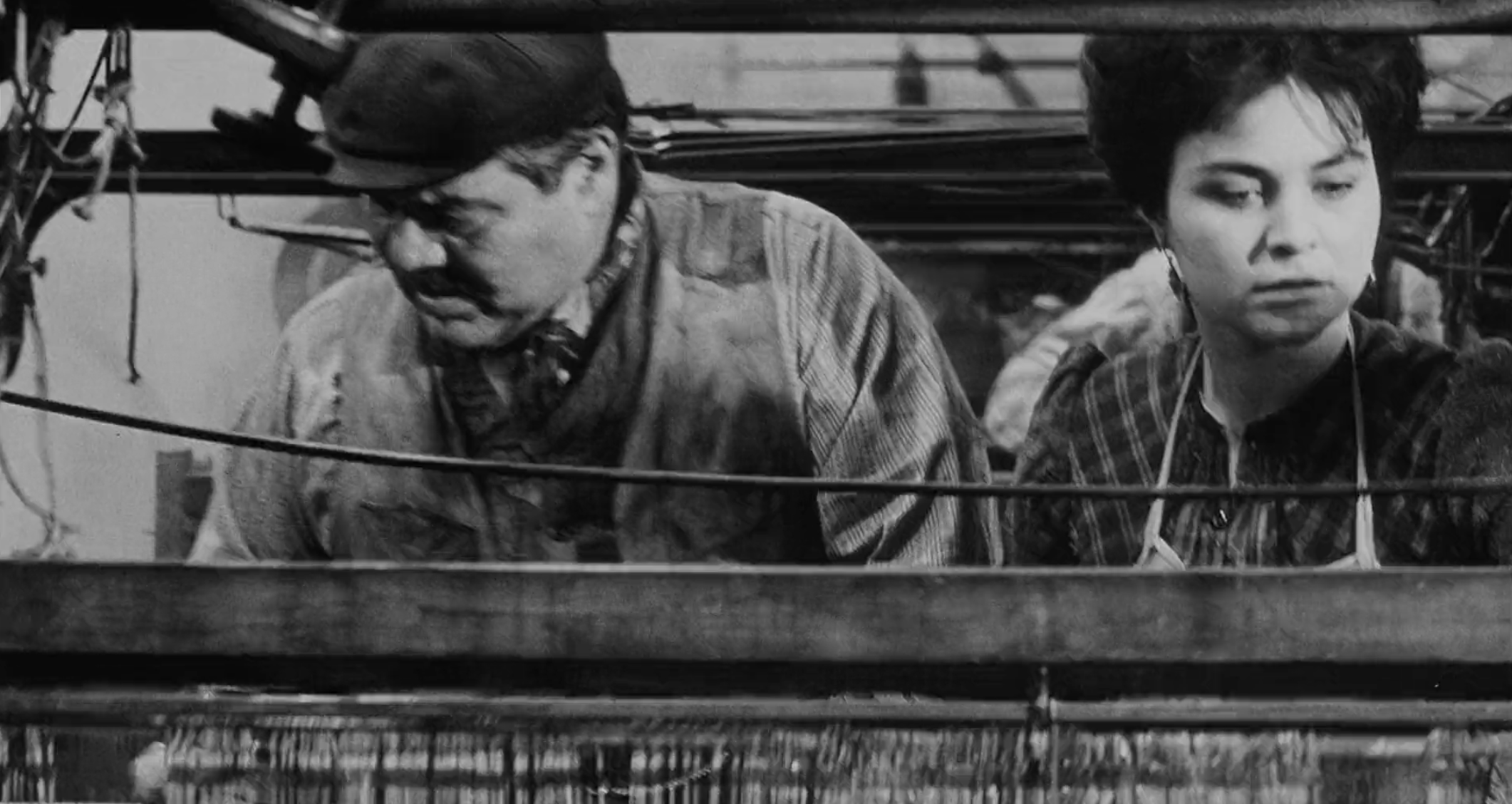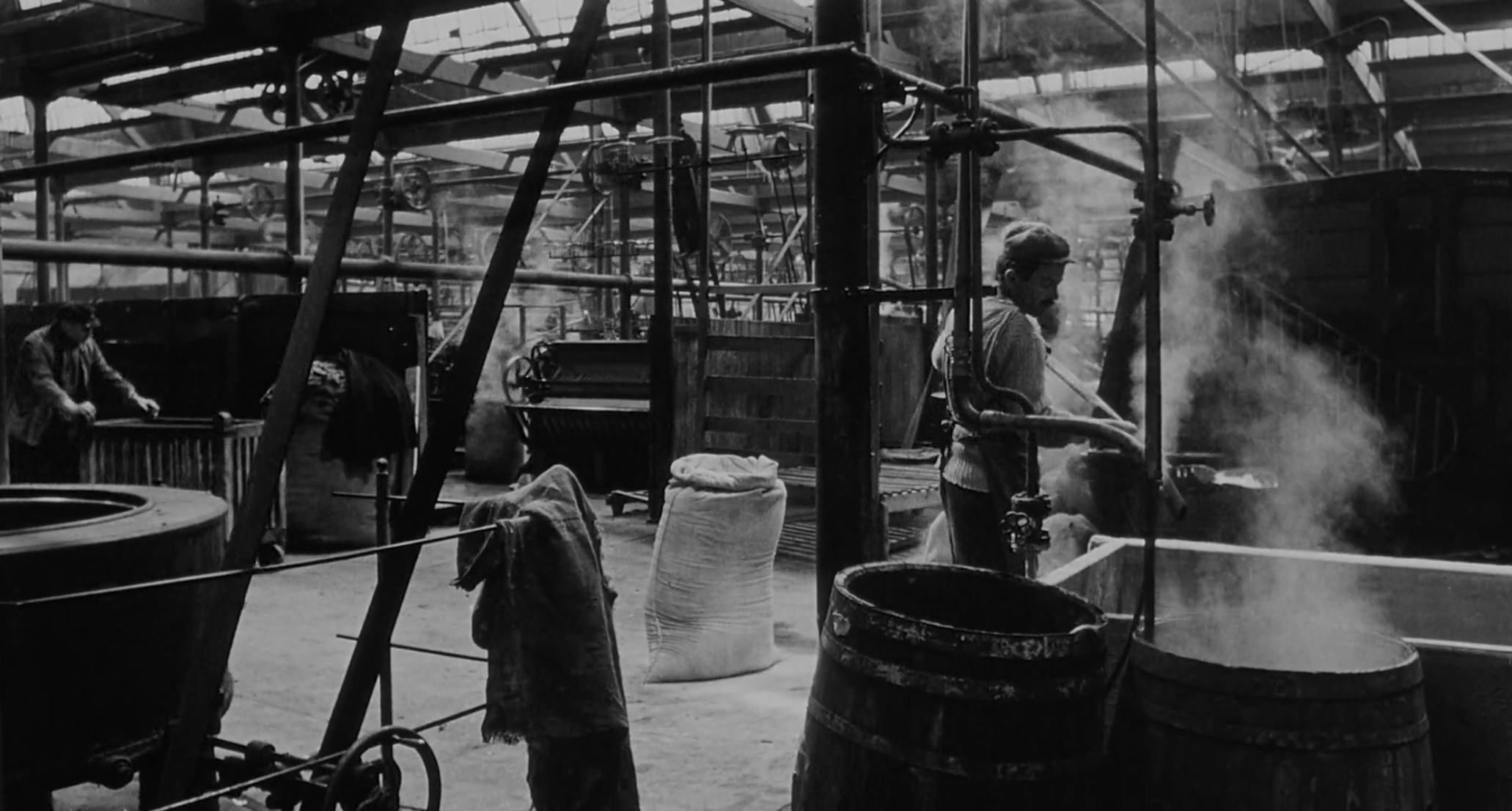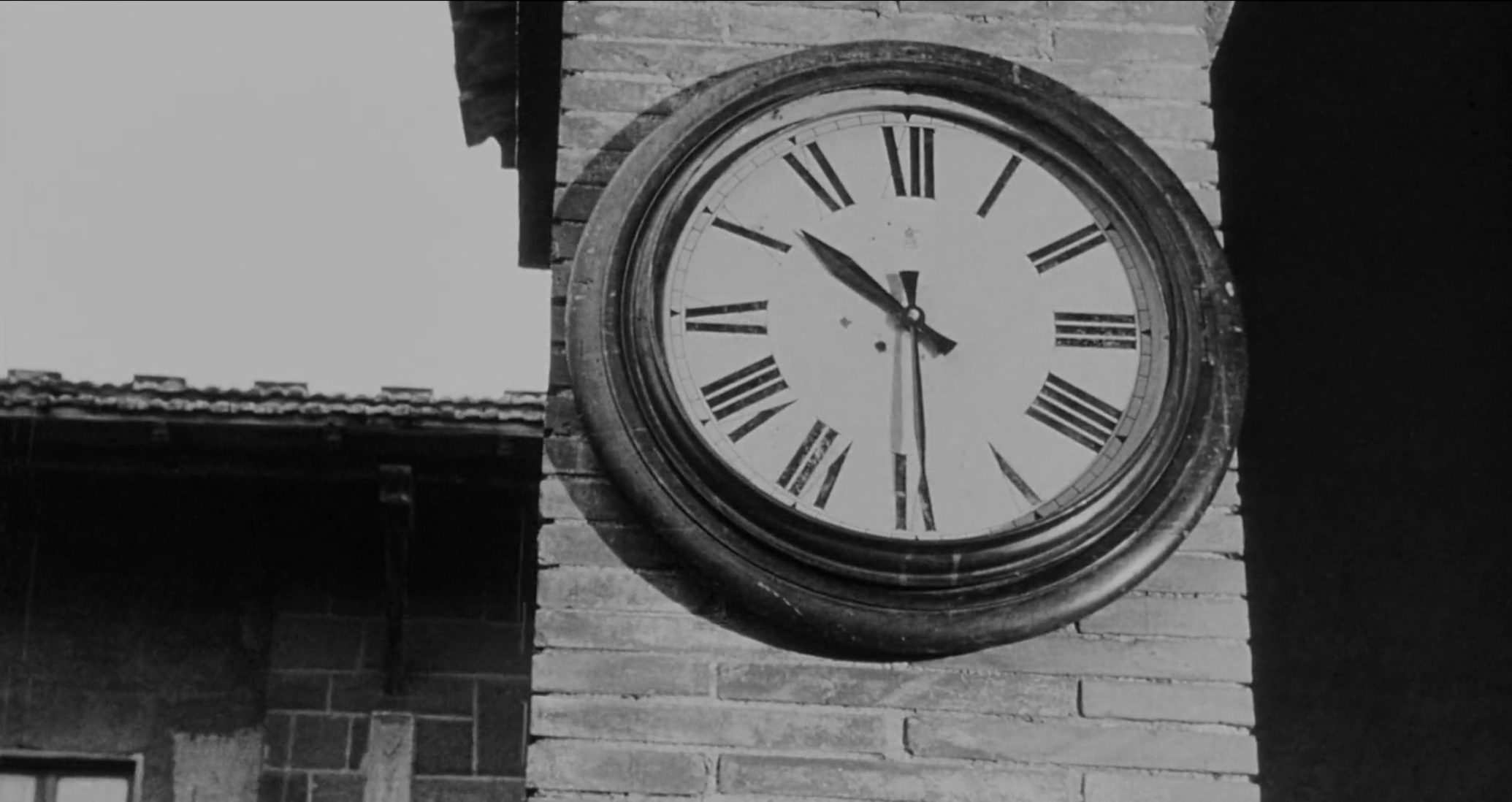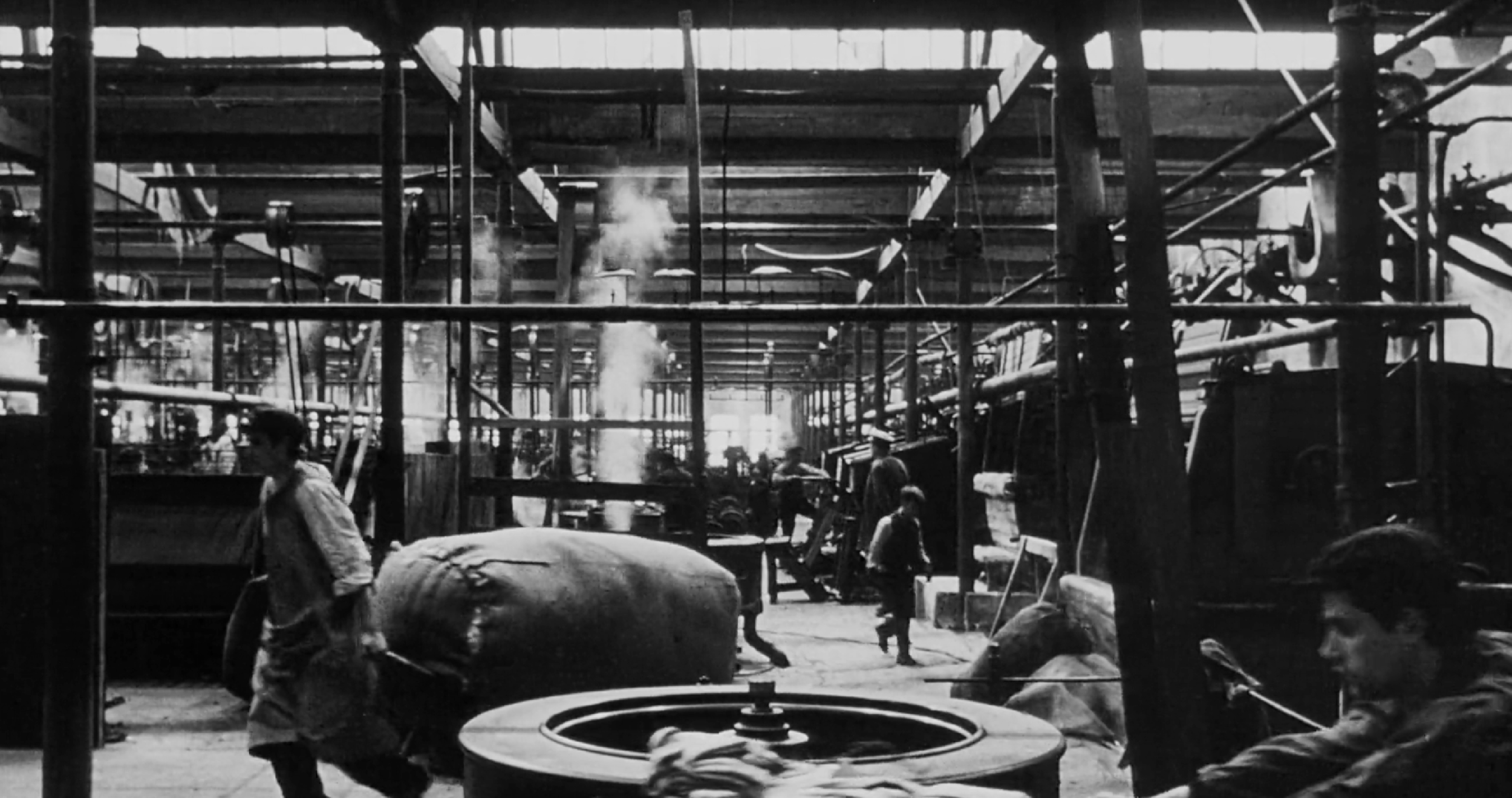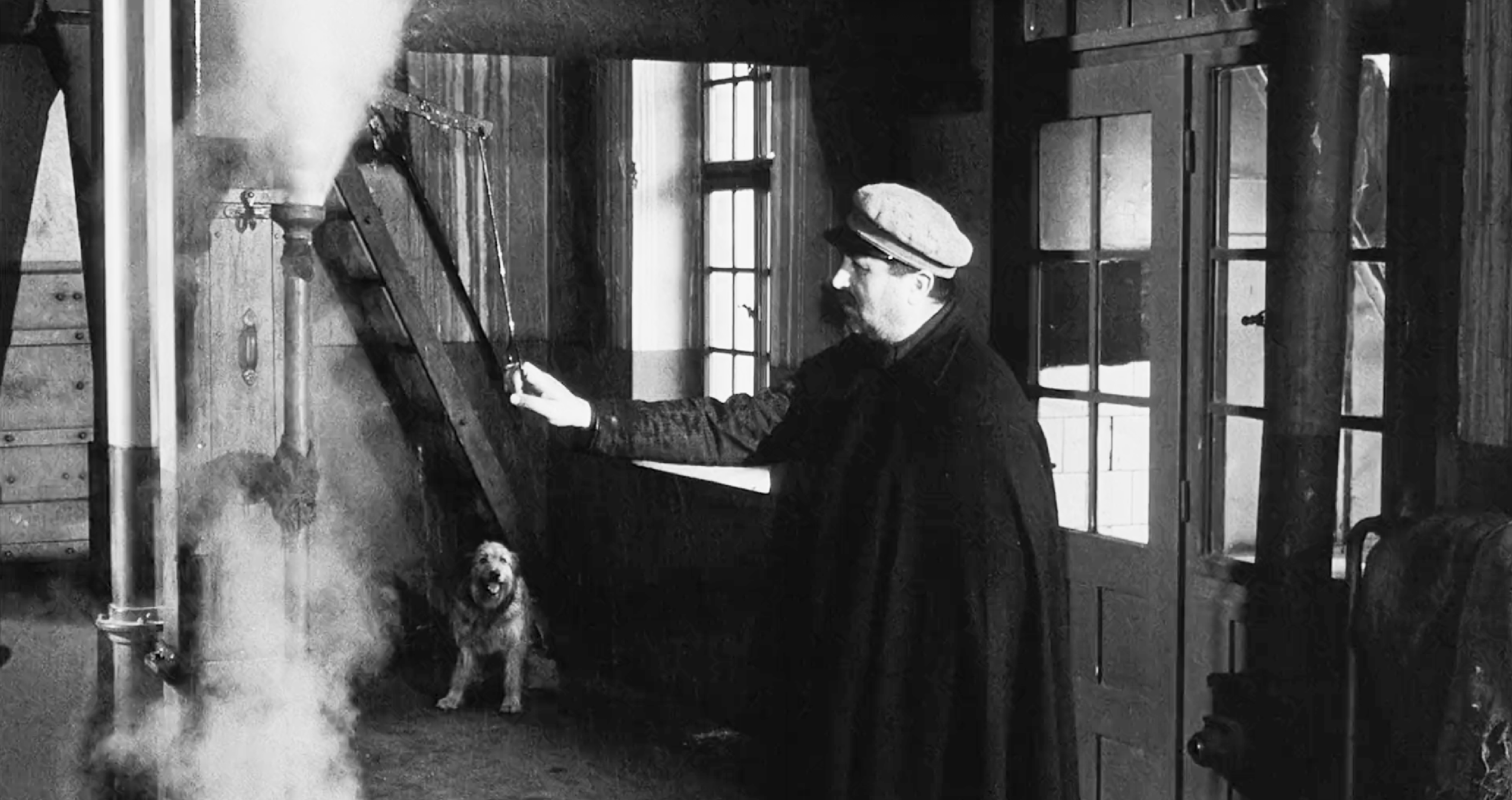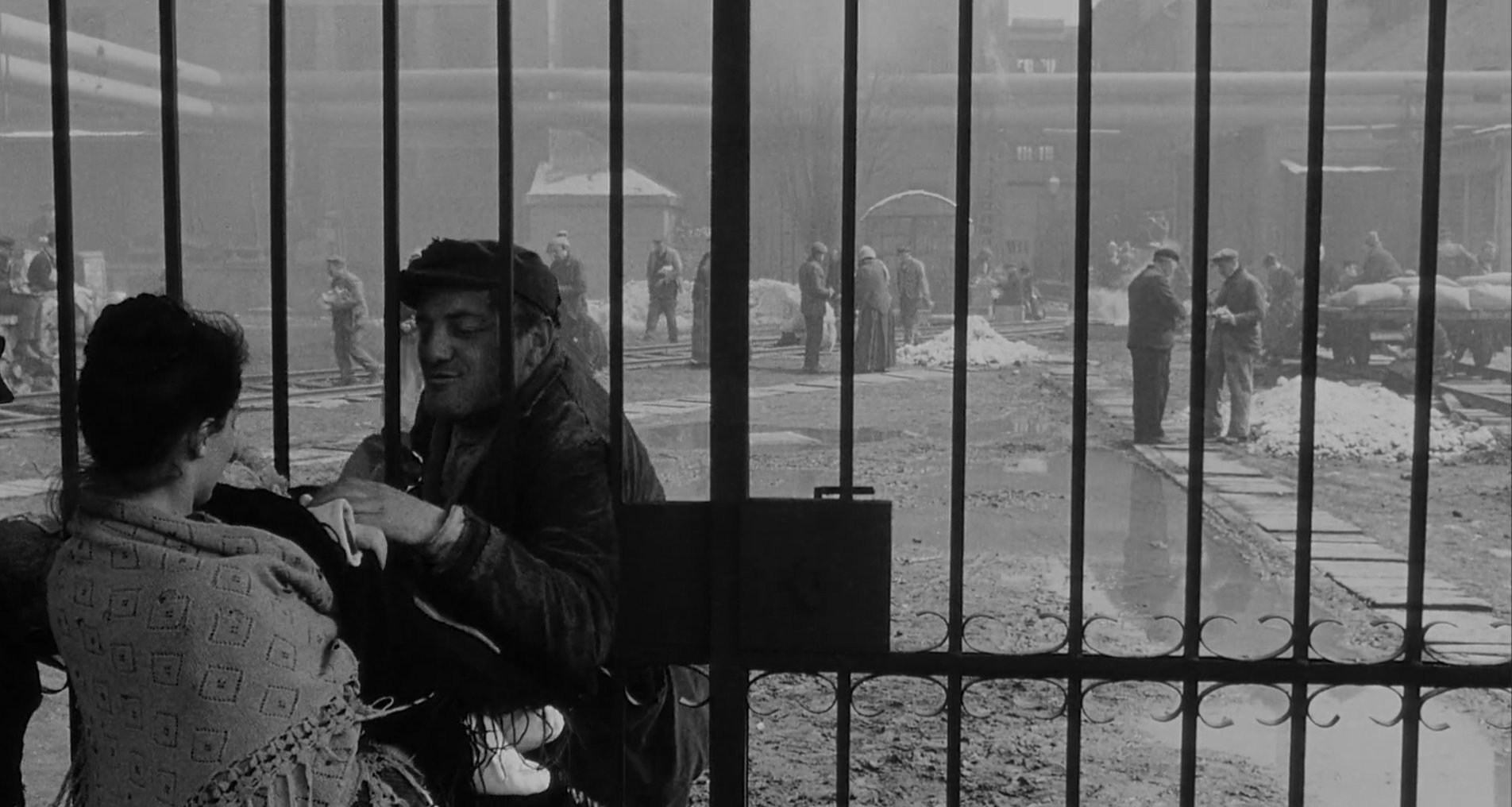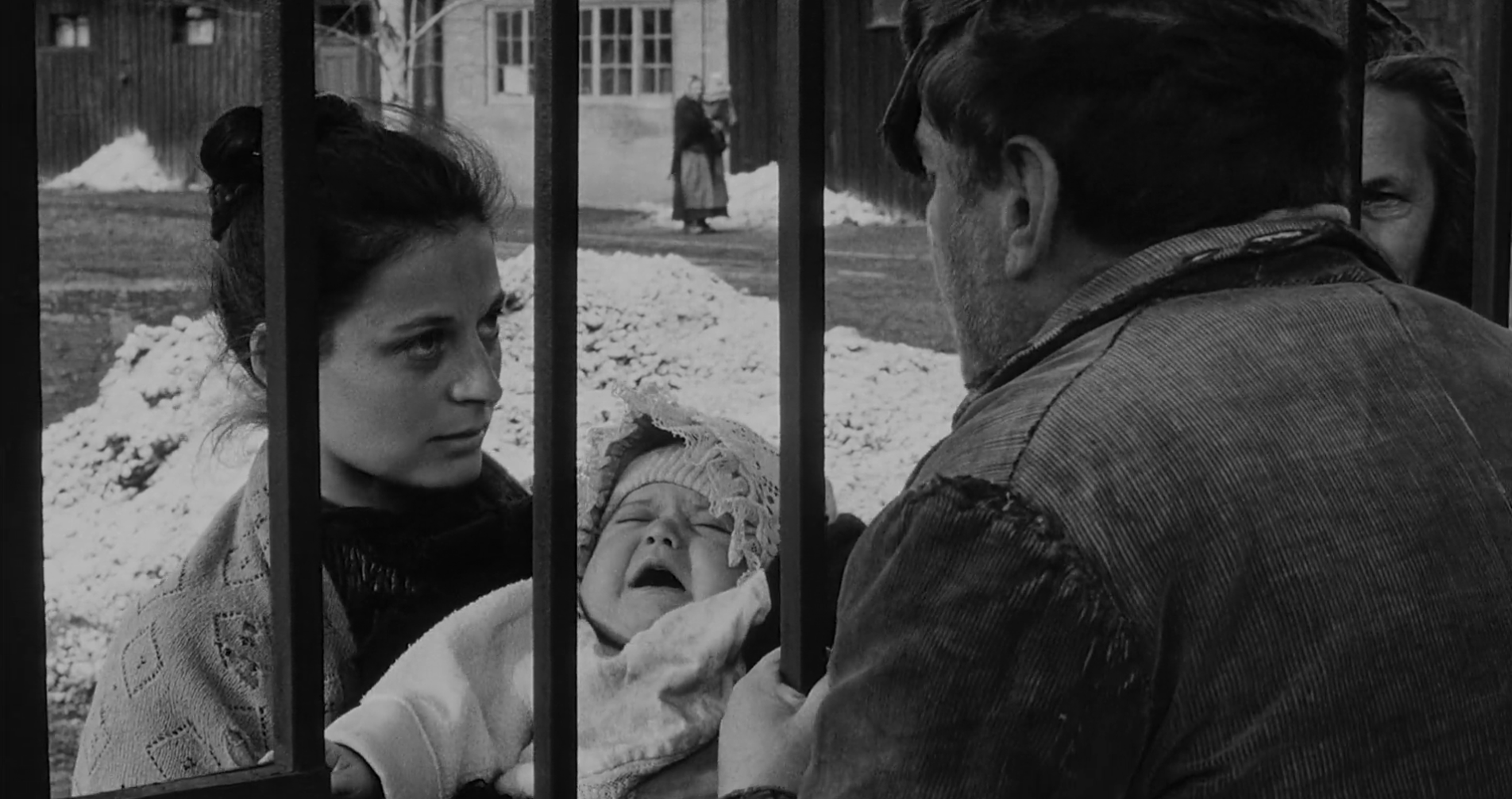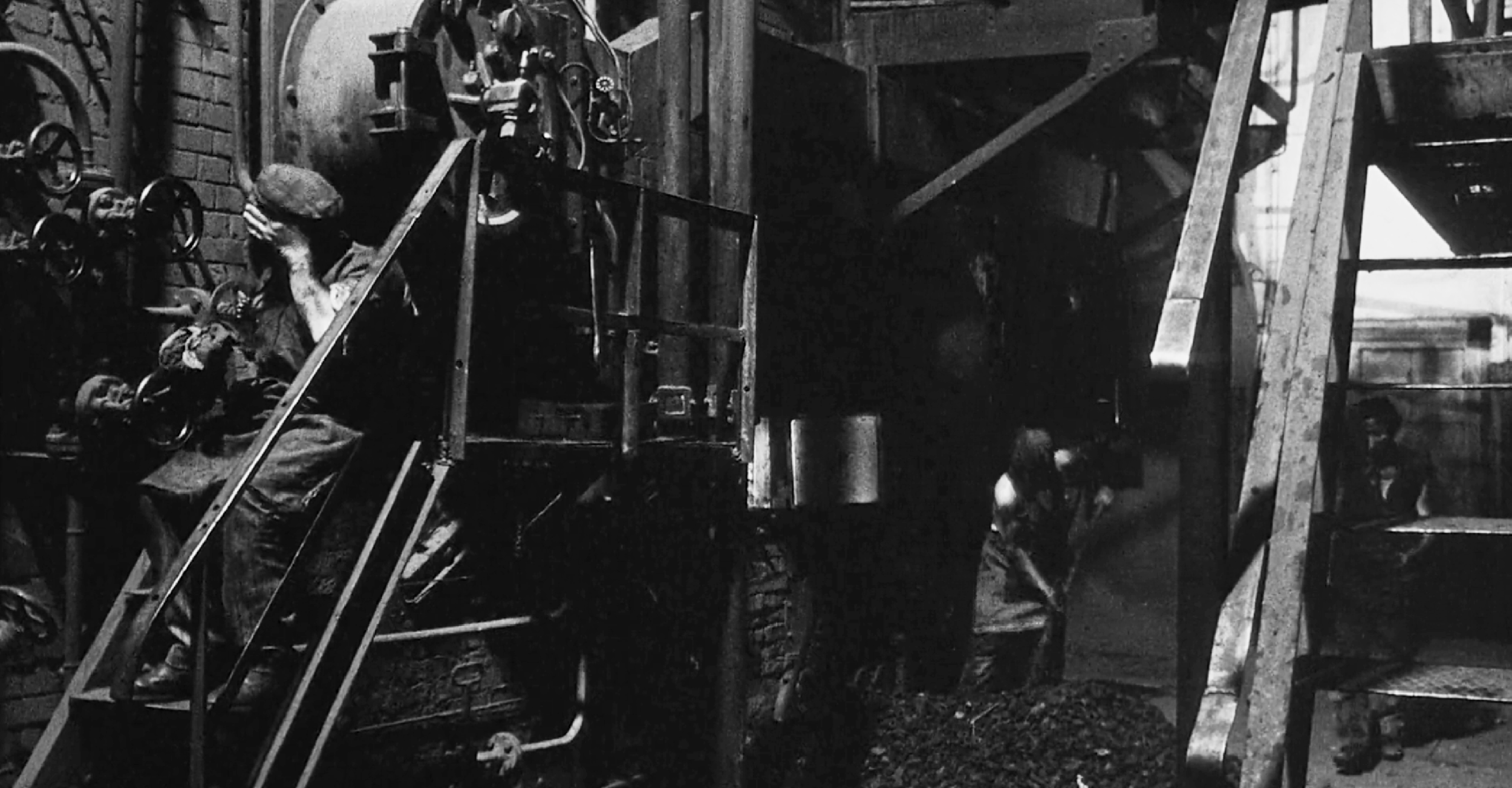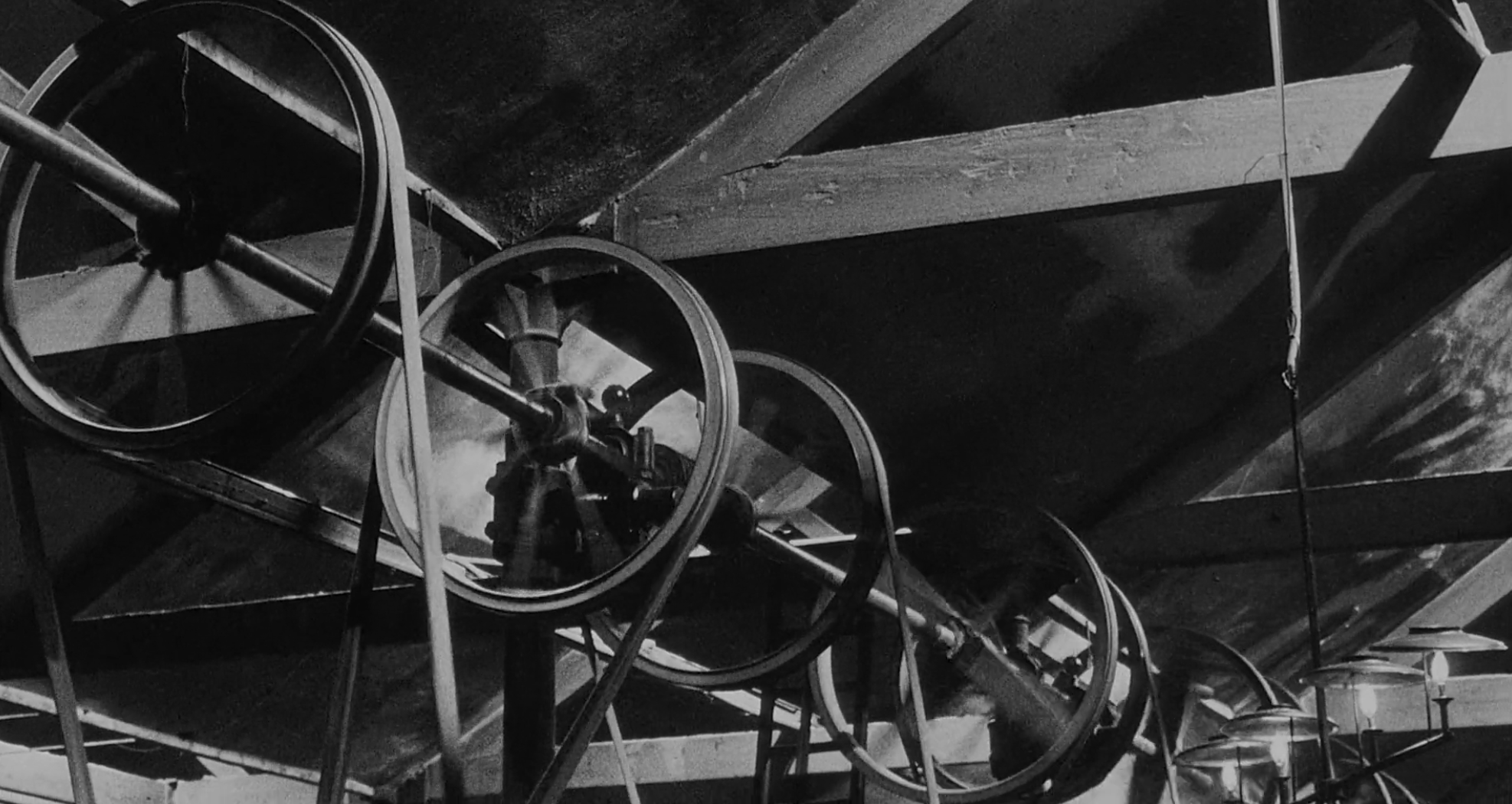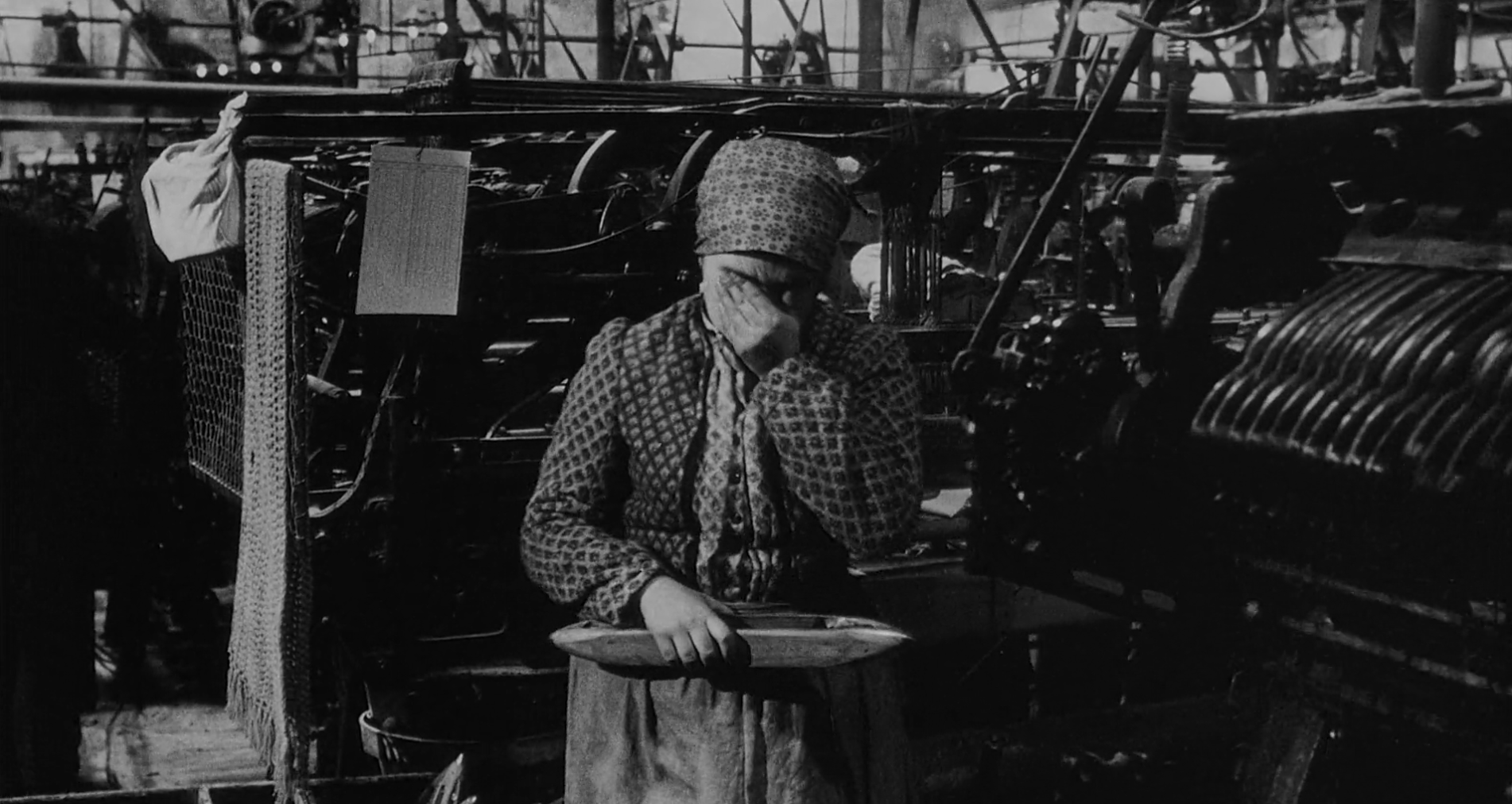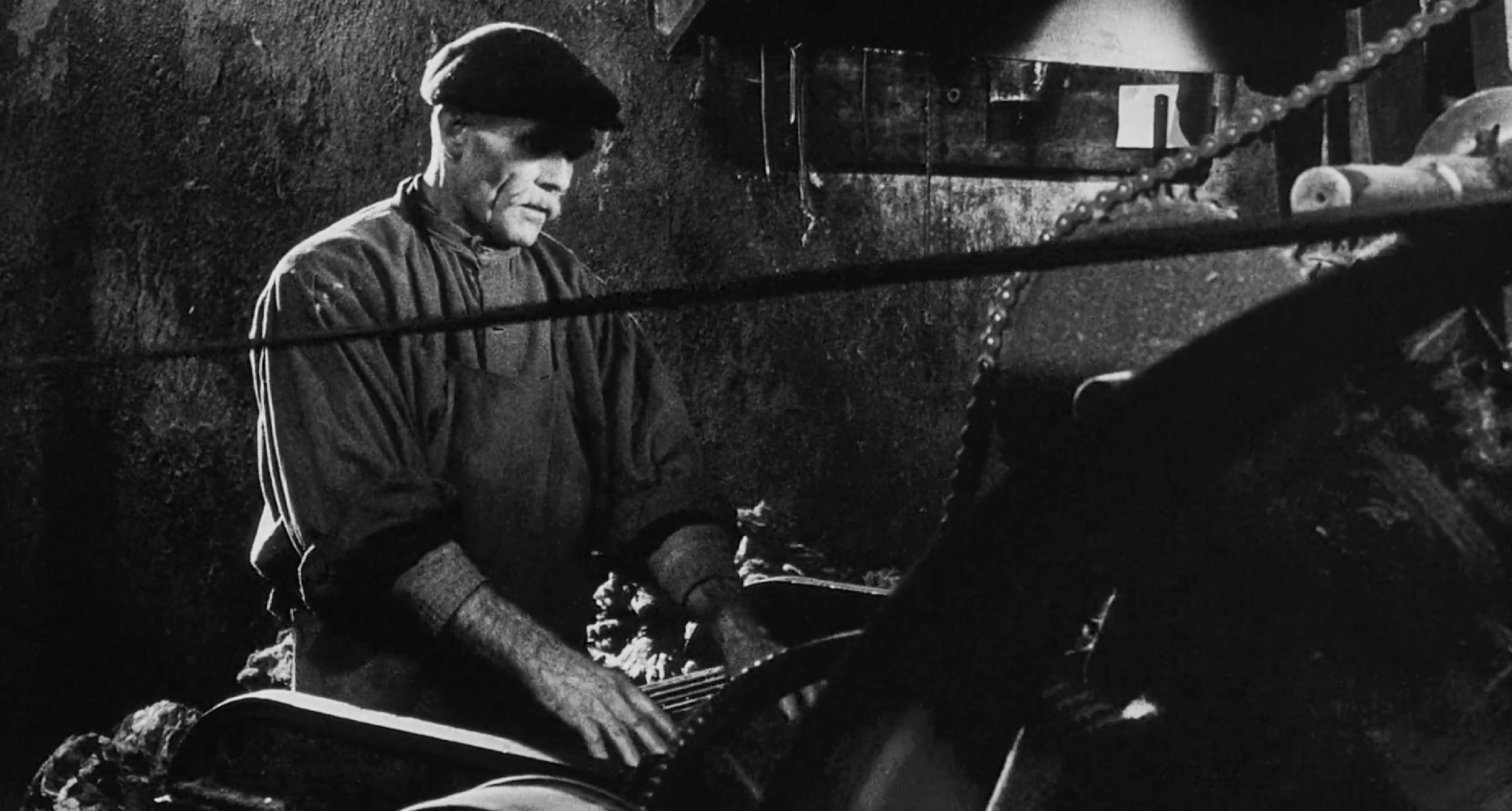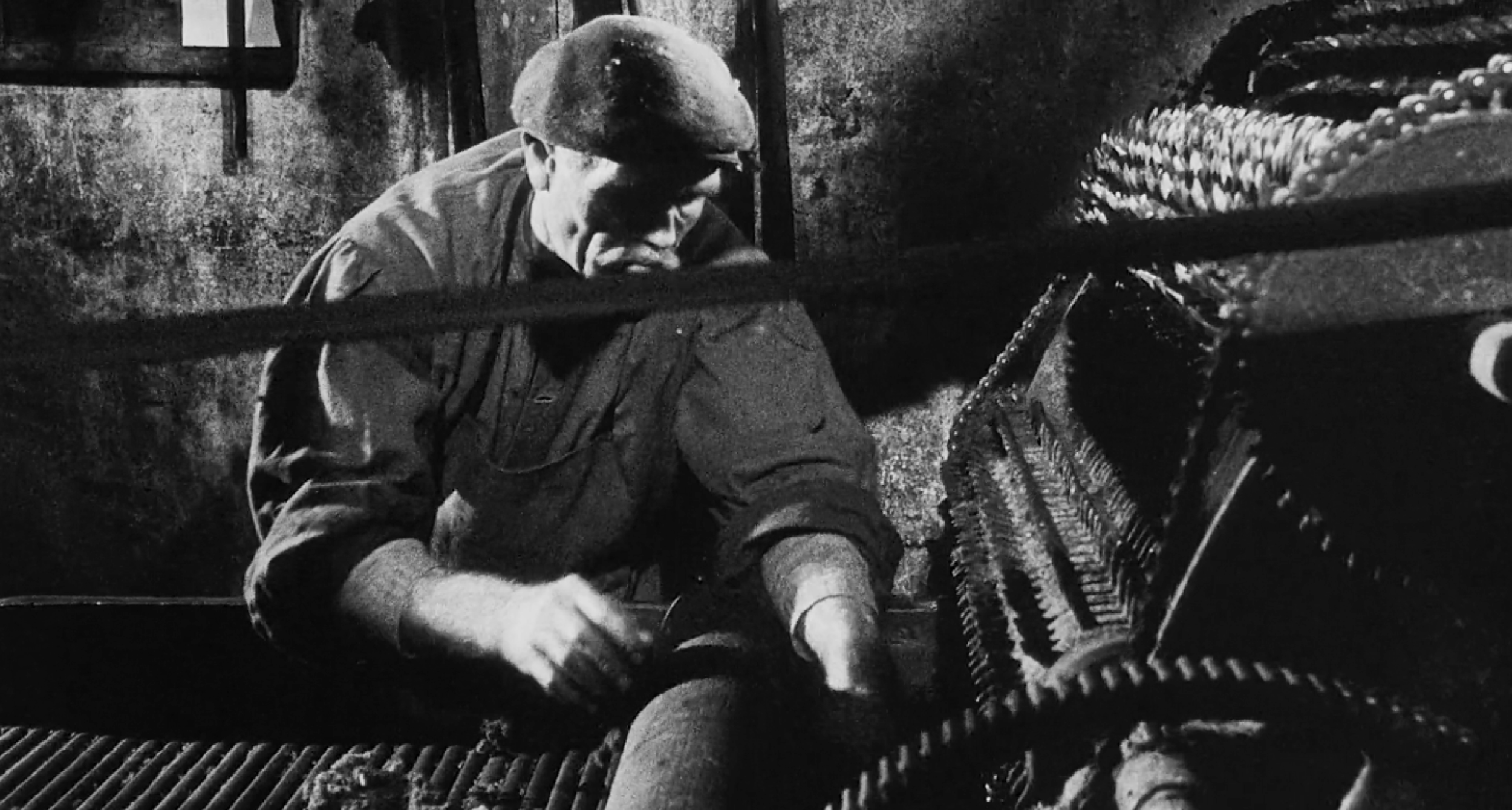Regia / Director: Mario Monicelli, 1963
Sceneggiatura / Screenplay: Age & Scarpelli
Fotografia / Cinematography: Giuseppe Rotunno
Nella sequenza dei titoli, fotografie d'archivio ci danno un’idea del luogo: Torino, alla fine del XIX secolo, durante la rivoluzione industriale.
In the title sequence, archival photographs give us a sense of place: Turin, at the end of the nineteenth century, during the industrial revolution.
Nella casa di un operaio di una filanda, vediamo una donna appendere una lanterna e poi andare al letto di suo figlio. "Dai! Sveglia! Sono le 5:30!" L'adolescente, Omero (Franco Ciolli), si mette a sedere sul letto, con gli occhi assonnati.
In a mill worker’s home, we see a woman hang a lantern, and then go to her son’s bed. “Come on! Wake up! It’s 5:30!” The teenager, Omero, sits up in bed, sleepy-eyed.
Il ragazzo va a lavarsi, ma l'acqua è completamente congelata. La rompe con un manico di scopa. "Lavati bene, eh?" – grida sua madre dall'altra stanza – "Anche il collo e le orecchie!" Ma dopo aver immerso il dito nell’acqua ghiacciata, controlla per vedere se lei sta guardando, poi mette giù il sapone e salta il lavaggio.
The boy goes to wash, but the water is frozen solid. He breaks it with a broomstick. “Wash well, you hear?” his mom yells from the other room. “Your neck and ears, too!” But after dipping his finger into the icy water, he checks to see if she’s watching, then puts down the soap and skips the wash.
Fa freddo e il carbone non si accende a causa dell'umidità della casa.
Omero si veste per il lavoro, poi chiama suo fratello: "Su! Sveglia!"
It is cold, and the coal won’t light because of the damp of the house.
Omero gets dressed for work, then calls to his brother, “Come on! Wake up!”
Il ragazzo odia la scuola, dice Omero a sua madre; per questo non si alza. "Io magari non so leggere, ma i numeri li conosco!" – dice – "E questo è proprio un bello zero!" aggiunge, mostrando il quaderno del suo fratellino.
The boy hates school, Omero tells his mother; that’s why he’s not getting up. “Maybe I can't read, but I know numbers!” he says. “And this is a big fat zero!” he adds, holding up his little brother’s notebook.
Omero prende un rapido sorso di caffè e un morso di pane prima che sua sorella Bianca (Raffaella Carrà) gli porga il pranzo.
Omero takes a quick gulp of coffee and a bite of bread before his sister Bianca hands him his lunch.
Nella sala da pranzo, il tavolo è cosparso di tazze e carte; lenzuola e panni bianchi pendono dappertutto. La madre di Omero è una piccola figura scura nella cucina al di là della stanza. Mentre Omero comincia a uscire, lei urla: "Ma ti sei lavato?"
"Ciao!" risponde lui e si dirige al lavoro.
In the dining room, the table is littered with cups and papers; white sheets and cloths hang everywhere. Omero’s mother is a small dark shape in the kitchen beyond the room. As Omero starts to leave, she calls out, “But did you wash?”
“Bye!” he answers and heads out to work.
Fuori, Omero saluta Pautasso (Folco Lulli) e sua figlia Adele (Gabriella Giorgelli), che vivono al piano superiore. Insieme, camminano nell'oscurità verso la fabbrica tessile, mentre una lenta e malinconica melodia attraversa la scena.
Outside, Omero greets Pautasso and his daughter Adele, who live upstairs. Together, they walk in the darkness to the mill, as a slow, wistful melody drifts through the scene.
Si sta facendo giorno quando gli operai arrivano alla filanda, le cui ciminiere sono già avvolte dal fumo nero.
Day is breaking when the workers arrive at the mill, its chimneys already wreathed in black smoke.
Sono le sei di mattina: il turno sta iniziando. Pautasso e sua figlia entrano nella fabbrica. Gli operai si riversano dentro, alcuni correndo; i più giovani si attardano.
It’s six am: the shift is beginning. Pautasso and his daughter enter the factory. The workers pour in, some running; the younger ones dawdle.
Il fischietto suona. Mentre il caposquadra guarda, gli operai prendono il loro posto. Diamo la nostra prima sbirciata ai personaggi che saranno importanti per questa storia – Salvatore Arrò (Antonio Casamonica), che cammina verso il suo posto; Raoul (Renato Salvatori), che parla con Omero; Cesarina (Elvira Tonelli) seduta; Martinetti (Bernard Blier) al suo telaio; e naturalmente, Pautasso e sua figlia, Adele, che lavorano fianco a fianco.
The whistle blows. As the foreman watches, the workers take their places. We get our first glimpse of characters who will be important to this story – Salvatore Arrò, walking to his place; Raoul, talking to Omero; Cesarina sitting; Martinetti at his loom; and of course, Pautasso and his daughter, Adele, working side by side.
Una sequenza dinamica ci mostra la filanda in azione. In alto, le cinghie fanno girare freneticamente le ruote. Mentre gli operai fanno funzionare i telai, sembrano parte del macchinario. Due ragazzini sanno esattamente cosa devono fare in questo grande pandemonio.
A dynamic sequence shows us the mill in action. Overhead, belts turn wheels frantically. As the workers operate the looms, they seem part of the machinery. Two little boys know exactly what they have to do in this great pandemonium.
Con il passare della mattinata, il ritmo della filanda non rallenta mai.
As the morning wears on, the pace of the mill never slackens.
Ecco il fischio del pranzo: è l'una.
There’s the whistle for lunch: it’s one o’clock.
I lavoratori escono al freddo per mangiare. Un uomo si avvicina al cancello chiuso, dove sua moglie tiene il suo bambino. "Quando esco, dorme. Quando entro, dorme", si lamenta l'uomo, mentre il bambino comincia a piangere. "Non mi conosce neanche..."
The workers go out into the cold to eat. One man walks over to the locked gate, where his wife holds his baby. “When I leave, he’s asleep. When I get home, he’s asleep,” the man complains, as the baby begins to cry. “He doesn’t even know me...”
I lavoratori consumano rapidamente il loro pranzo; alcuni si siedono sui binari della ferrovia. Il terreno è coperto da pozzanghere e cumuli di neve.
The workers quickly eat their lunch; some sit on the railroad tracks. The ground is covered with puddles and mounds of snow.
Pautasso mastica una gigantesca pagnotta e tracanna vino, mentre Arrò sta in piedi dietro, silenzioso e immobile.
Pautasso gnaws on a giant circular sandwich and guzzles down wine, while Arrò stands behind, silent and unmoving.
L’una e trenta: il fischietto suona. Gli operai raccolgono il loro pranzo e si dirigono nuovamente al lavoro. Pautasso si gira e chiede ad Arrò, barbuto e cupo: "Eh, Nebu,* tu hai fatto in tempo a mangiare?" Arrò annuisce senza parole.
*Gli italiani a volte danno dei soprannomi in base alle caratteristiche delle persone. In questo caso, Arrò è siciliano e i lavoratori gli assegnano vari soprannomi nel corso del film per la sua carnagione scura.
One thirty: the whistle blows. The workers gather up their lunches and head back to work. Pautasso turns and asks Arrò, bearded and somber, “Hey, dark one,* did you have time to eat?” Arrò nods wordlessly.
*Italians sometimes make nicknames out of people’s characteristics. In this case, Arrò is from Sicily and the workers assign him nicknames because of his swarthy complexion.
La stessa piccola melodia agrodolce fluttua nell'aria mentre gli operai tornano alla filanda, brontolando. Sono seguiti da un sorvegliante con un cane. "Forza! Muoversi!"
"Questi bastardi ci trattano come le bestie!"
"Neanche fossimo in galera!"
"Che se li porti via il diavolo!"
The same small, bittersweet melody floats in the air as the workers walk back to the mill, grumbling. They’re followed by an overseer with a dog. “Get going! Move it!”
“The bastards treat us like animals!”
“As if we were in prison!”
“To hell with them!”
Omero si stiracchia e sbadiglia. Tutti sono esausti e si strofinano gli occhi stanchi. Sono le otto di sera e hanno lavorato per quattordici ore, con solo trenta minuti di pausa per il pranzo.
Omero stretches and yawns. Everyone is exhausted, rubbing their weary eyes. It is eight o’clock at night, and they have been working for fourteen hours, with only a thirty-minute break for lunch.
Vediamo Mondino, un operatore di macchina, che si appisola. Si sveglia di soprassalto e si rimette subito al lavoro, infilando degli stracci tra le ruote dentate in movimento della sua macchina.
We see Mondino, a machine operator, nod off. He wakes with a start and gets right back to work, stuffing rags between the moving gears of his machine.
Il costante ronzio ritmico delle macchine è interrotto da un urlo: "Il mio braccio!" Tutti alzano la testa.
The steady rhythmic hum of the machines is broken by a scream: “My arm!” Everyone looks up.
La macchina da presa si sposta rapidamente su un uomo con il braccio sinistro incastrato nel macchinario. Gli operai accorrono al suo fianco.
The camera pans quickly to a man with his left arm caught in the machinery. Workers rush to his side.
"Fermate le macchine!" "Fermate la ruota!" Ma i rulli continuano a macinare, masticando il braccio dell'uomo.
Arriva il robusto Pautasso. "Via! Via!" Con l'aiuto di altri, riesce a fermare la macchina.
“Stop the machines!” “Stop the wheel!” But the rollers grind on, chewing up the man’s arm.
The burly Pautasso arrives. “Get out of the way!” With the aid of some others, he manages to stop the machine.
Mentre i lavoratori si stringono intorno all'uomo ferito, le loro spalle riempiono lo schermo fino a quando l’immagine non sfuma al nero.
As the workers press in around the injured man, their backs fill the screen until the image fades to black.
FINE PARTE I
Here’s Parte II of this cineracconto. Check back then – or subscribe to receive a weekly email newsletter with links to all our new posts.
A note about the translation:
The dialogue in the cineracconto (photo-story) of I COMPAGNI (THE ORGANIZER), for the most part, reflects the actual spoken dialogue of the film. Occasionally, we’ve changed a word or phrase to a more basic level to make the cineracconto more accessible to a wider range of language learners. For example, in Parte VI, we changed “ci stiamo rimettendo” (we’re falling behind) to “stiamo perdendo soldi” (we’re losing money). But for the most part, you’ll see the actual spoken battute (lines). Likewise, we’ve kept the language more reflective of the place and time. In Parte II, we translate “sventola” as “doll,” not as “babe,” which would be a modern usage. But where a more modern way of speaking would not be out of place, we’ve used the form most useful to students for everyday application today. We’ve also translated the Sicilian dialect spoken by one of the characters into standard Italian.
For those watching the film with the English subtitles, note that almost every line was changed from its original meaning by an overenthusiastic subtitler! The Italian subs are as close to accurate as subs get – of course, sometimes they have to be briefer than the spoken dialogue, etc.
While our past, more advanced level cineracconti (up to THE SOUTHERNER, June 2021) included pretty much every scene and nearly all the dialogue verbatim from our films, our lower intermediate level cineracconti (starting with OSSESSIONE, September 2021) are shorter and recount a more abbreviated version of the film. (To see the more advanced cineracconti, please go to the blog Welcome page where the Italian movies are listed on top; Italian and international films are directly below, in chronological order.)
In writing our cineracconti, we aim for a fluid, standard Italian – though in places, it might seem more basic than how an average Italian would speak. Then we write an English translation – which is naturally also at an intermediate level of English. You will not see a literal – word-for-word – translation, but rather, a “literary” one: an accurate representation of how someone would actually say the line in standard American English.
We love language and we sometimes spend a very long time debating a particular word or phrase. We’d be very happy to hear your thoughts about our translations. Write to us at info@liconoscevobene.net!






